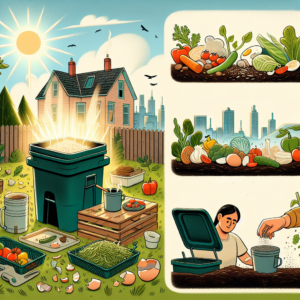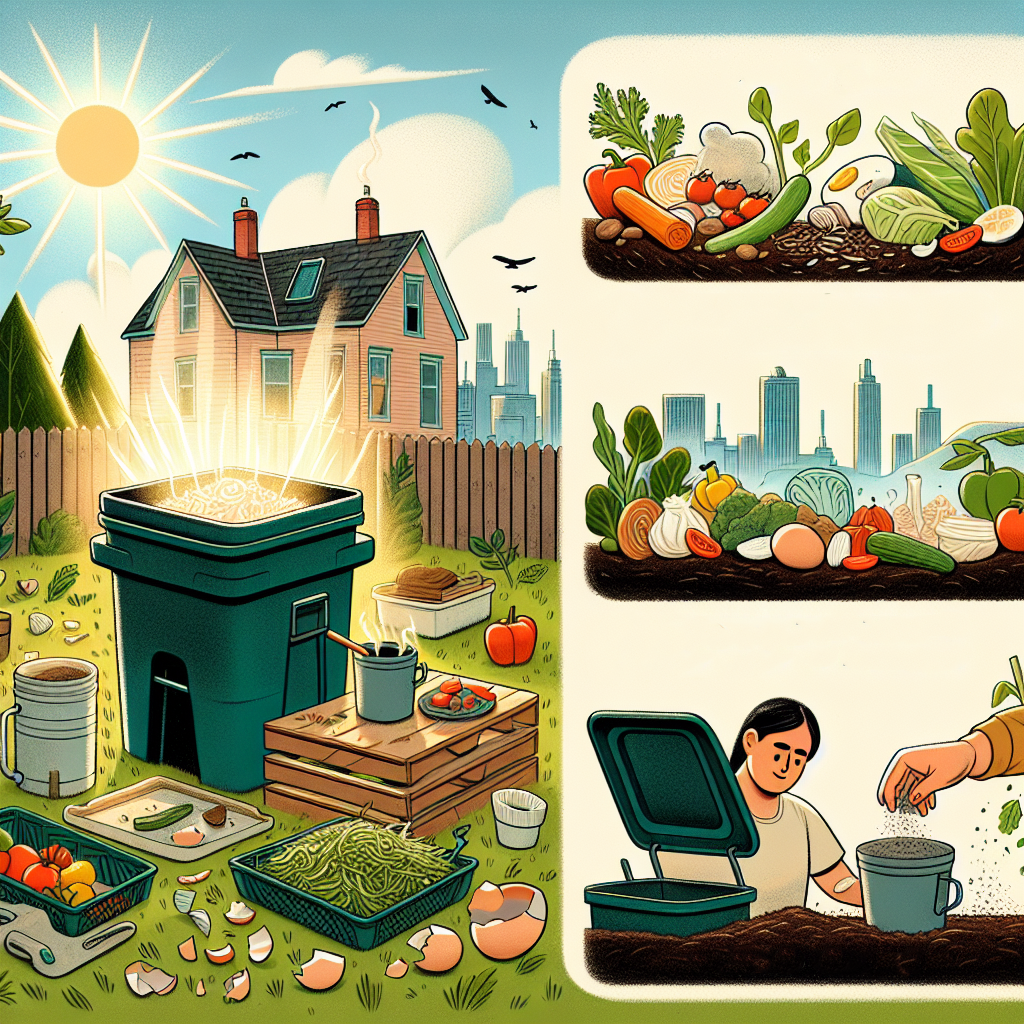Are you curious about the wonders of composting and how to get started? Well, you’re in luck! This article explores the incredible benefits of composting and provides you with all the information you need to begin your own composting journey. From reducing waste and enriching your garden soil to promoting sustainability and saving money, composting has numerous advantages that will leave you feeling both environmentally conscious and rewarded. So, grab your gardening gloves and get ready to discover the world of composting!

Benefits of Composting
Composting is not only great for the environment but also offers numerous benefits for your garden, reduces waste, improves soil quality, and even saves you money. By diverting your organic waste from the landfill and transforming it into nutrient-rich compost, you contribute to a more sustainable and eco-friendly lifestyle.
Environmental Benefits
One of the primary benefits of composting is its positive impact on the environment. Organic waste that goes to landfills produces methane, a potent greenhouse gas that contributes to climate change. However, by composting your food scraps, yard trimmings, and other organic materials, you help reduce methane emissions and combat global warming.
Additionally, composting reduces the need for chemical pesticides and fertilizers in gardening and farming. Instead of relying on harmful synthetic products, compost enriches the soil naturally, providing essential nutrients to plants while promoting healthier growth and greater resistance to pests and diseases.
Sustainable Gardening
Composting is a fundamental component of sustainable gardening practices. By using compost as a natural soil amendment, you create a fertile environment for your plants to thrive. Compost improves soil structure, allowing it to retain more moisture, drain better, and resist erosion. It also enhances soil aeration, benefiting the roots of your plants, leading to healthier and more robust growth.
Furthermore, compost acts as a natural slow-release fertilizer, providing a steady supply of nutrients to your plants over time. Unlike synthetic fertilizers that can harm the environment and lead to nutrient imbalances, compost nourishes your plants in a sustainable and balanced manner.
Waste Reduction
Composting significantly reduces the amount of organic waste that ends up in landfills. Food scraps, yard trimmings, leaves, and other compostable materials make up a significant portion of household waste. Instead of simply throwing these materials away and contributing to the growing problem of overflowing landfills, composting offers a solution.
By composting your organic waste, you divert it from the waste stream and turn it into a valuable resource. Not only does this reduce the need for landfill space, but it also helps decrease the production of methane gas, which is a significant contributor to climate change.
Soil Improvement
Compost is often referred to as “black gold” because of its remarkable ability to improve soil quality. When you add compost to your garden or flower beds, it enriches the soil by increasing its organic matter content. This, in turn, enhances soil fertility and promotes better plant growth.
Compost also improves soil structure, allowing it to hold more water while still providing adequate drainage. This water-holding capacity is particularly beneficial during dry periods, as it helps roots access moisture more effectively. Additionally, compost adds beneficial microorganisms to the soil, increasing its biological activity and creating a healthier ecosystem for plants to thrive.
Cost Savings
Incorporating compost into your gardening routine can lead to substantial cost savings. By creating your own compost, you reduce the need to purchase expensive synthetic fertilizers and soil amendments. Compost acts as a natural and cost-effective alternative that provides all the necessary nutrients for plant growth.
Furthermore, using compost helps conserve water. Its ability to retain moisture and improve soil structure means you won’t have to water your plants as frequently. This leads to decreased water consumption, resulting in lower water bills and a more sustainable use of this precious resource.
Getting Started with Composting
Now that you’ve learned about the benefits of composting, let’s dive into the necessary steps to get started with this environmentally friendly practice.
Choosing a Composting Method
There are several methods of composting to choose from, depending on your lifestyle, space, and available resources. Some common methods include:
- Backyard Composting: This method involves creating a compost pile or using a compost bin in your backyard. It is suitable for homeowners with sufficient outdoor space and is an excellent choice for those who generate a significant amount of organic waste.
- Vermicomposting: Vermicomposting utilizes earthworms to break down organic waste. It is an ideal option for individuals with limited outdoor space or who live in apartments or urban areas.
- Trench Composting: Trench composting involves burying organic waste directly in the ground, accelerating decomposition and enriching the soil in the process.
Choose the composting method that best suits your needs and available resources.
Selecting a Compost Bin
If you opt for backyard composting, selecting the right compost bin is crucial. There are various types of compost bins available, including:
- Stationary Bins: These bins are typically made of wood or plastic and are great for homeowners with ample space. They provide easy access to the compost pile and help contain it.
- Tumbling Bins: Tumbling bins are designed to make turning the compost easier. They allow for better aeration and speed up the decomposition process.
- Wire Mesh Bins: Wire mesh bins are a cost-effective and straightforward option for creating compost piles. They provide excellent airflow and are easy to construct.
Consider factors such as size, cost, ease of use, and aesthetics when selecting a compost bin that suits your needs.
Deciding on Compostable Materials
Not all organic materials are suitable for composting. It is essential to choose the right compostable materials to ensure a healthy and balanced compost pile. The materials that can be composted include:
- Fruit and vegetable scraps
- Coffee grounds and filters
- Eggshells
- Yard trimmings
- Leaves
- Shredded paper and cardboard
Avoid composting meat, dairy products, oily foods, and pet waste, as these can attract pests or introduce harmful bacteria into your compost pile.
Preparing a Compost Pile
To start composting, you’ll need to create a compost pile. Follow these steps to prepare your compost pile:
- Choose a location: Select a suitable spot in your yard that is well-drained and easily accessible.
- Layer your materials: Begin by layering a mix of green and brown organic materials. Green materials, such as fruit scraps and grass clippings, provide nitrogen, while brown materials, such as leaves and shredded paper, provide carbon.
- Add water: Moisten the compost pile to ensure proper moisture levels. The compost should have the consistency of a damp sponge.
- Turn the pile: Regularly turn the compost pile to promote aeration and speed up the decomposition process. This can be done with a pitchfork or shovel.
Maintaining a Compost Pile
Keeping your compost pile well-maintained is essential for successful composting. Follow these maintenance tips:
- Monitor moisture levels: Ensure your compost pile remains moist but not waterlogged. If it becomes too dry, water it gently. If it becomes too wet, add additional brown materials to balance the moisture content.
- Turn the pile regularly: Regularly turning the compost pile helps distribute heat and oxygen, accelerating decomposition. Aim to turn the pile every few weeks or when the internal temperature drops.
- Add compostable materials: Continually add compostable materials to your pile, ensuring a constant supply of organic waste that will break down and transform into nutrient-rich compost.
- Patience is key: Composting is a natural process that takes time. Be patient, and in a few months to a year, you will have rich and dark compost ready to use in your garden.
By following these steps and maintaining your compost pile, you will soon have a steady supply of nutrient-rich compost to feed your garden and contribute to a greener planet.
In conclusion, composting offers numerous benefits for the environment, gardening, waste reduction, soil improvement, and cost savings. By choosing a composting method, selecting the right compost bin, deciding on compostable materials, preparing a compost pile, and maintaining it properly, you can embark on an exciting journey towards sustainability and create nutrient-rich compost that will nourish your garden for years to come. Happy composting!

